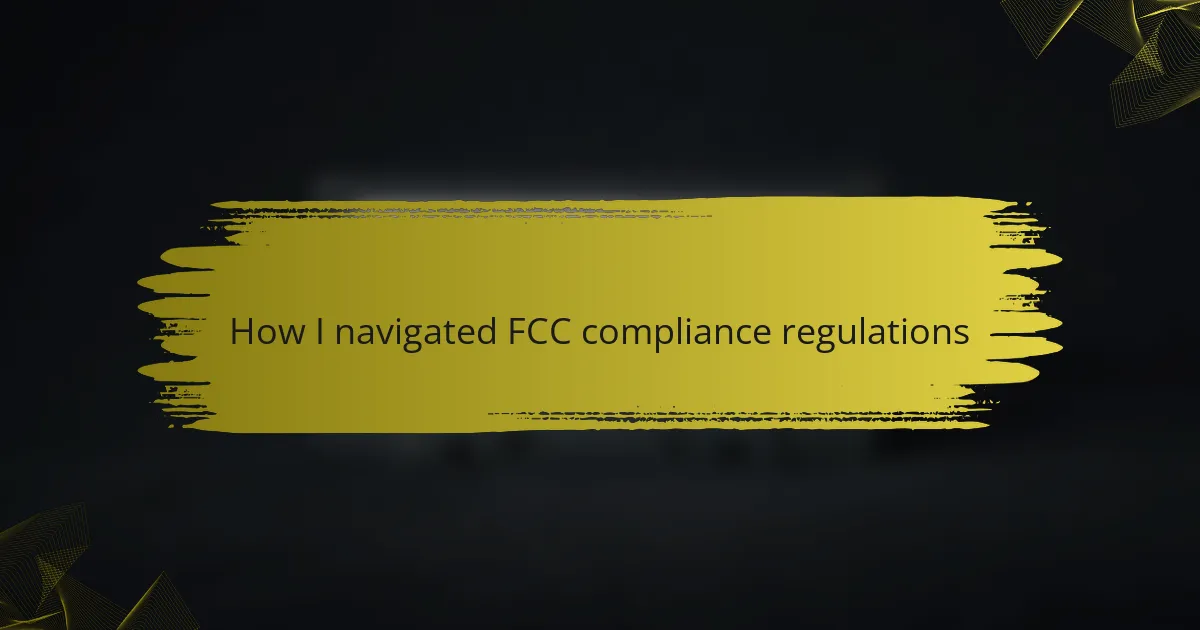Key takeaways
- Understanding and adhering to FCC compliance regulations is essential for building trust with listeners and maintaining the integrity of independent radio stations.
- Key compliance areas include licensing requirements, content regulations, public file maintenance, and the Emergency Alert System (EAS).
- Regular training, thorough research, and networking with industry peers are crucial strategies for navigating compliance challenges successfully.
- Utilizing reliable resources, such as the FCC website and professional associations, can greatly assist independent radio stations in staying informed about compliance updates.
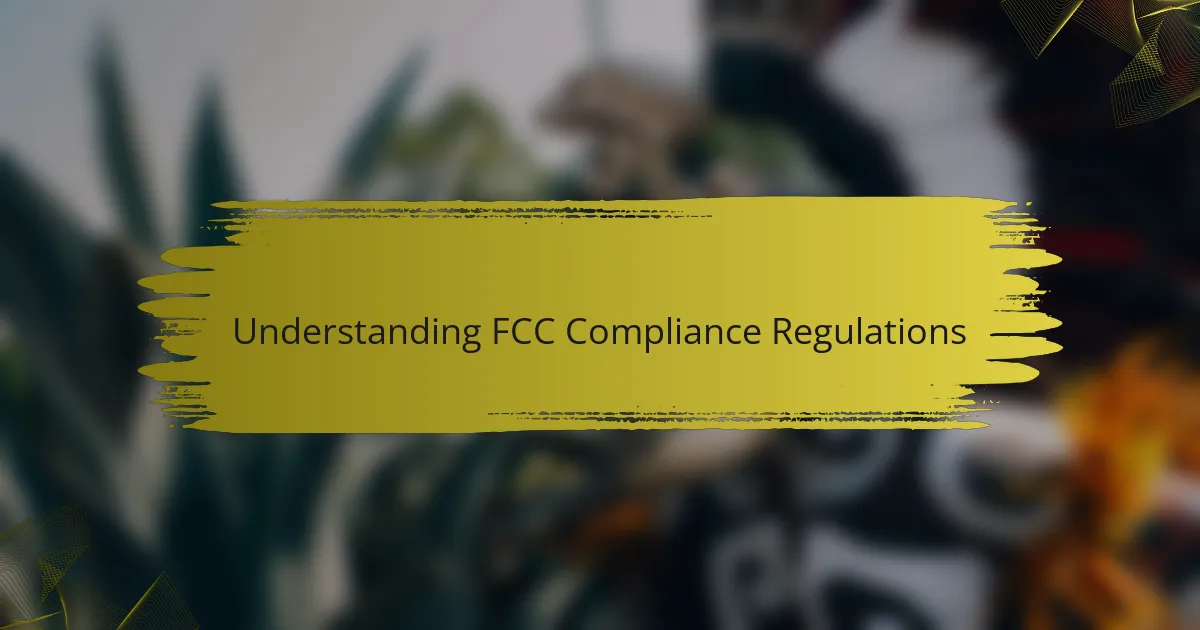
Understanding FCC Compliance Regulations
Understanding FCC compliance regulations can feel overwhelming, especially for those of us venturing into independent radio media. I remember my initial days, poring over the intricate rules and wondering how my tiny station could possibly meet such extensive requirements. However, breaking it down into manageable pieces helped me turn confusion into clarity.
When navigating these regulations, I found it beneficial to focus on key areas. Here are some crucial aspects of FCC compliance that I discovered during my journey:
- Licensing Requirements: Ensure you obtain the proper licenses, like the Station License, to operate legally.
- Public File Necessities: Maintain a public inspection file that includes essential documentation related to your station’s operation and community engagement.
- Content Regulations: Familiarize yourself with guidelines surrounding indecency and obscenity, as well as rules about political content.
- Emergency Alert System (EAS): Implement the EAS to stay prepared and inform your audience during emergencies.
- Station Identification: Regularly announce your station’s call sign to keep the public informed about your broadcasting identity.
By focusing on these elements, I found the process less daunting and more manageable, ultimately allowing me to run my station with confidence.
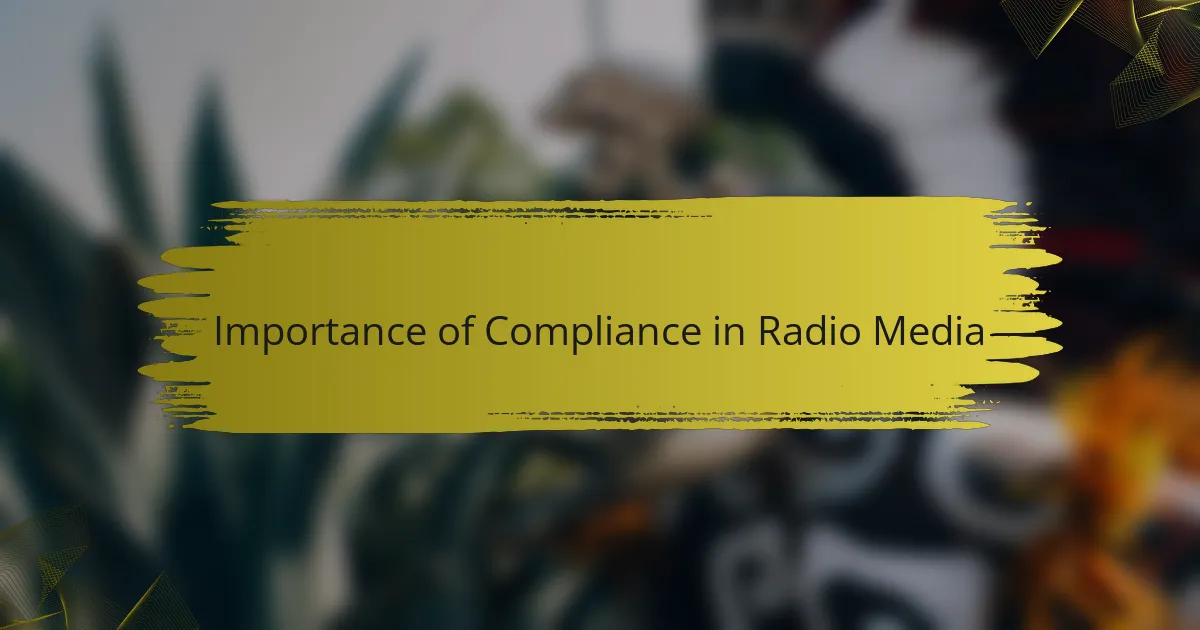
Importance of Compliance in Radio Media
Compliance in radio media isn’t just a legal obligation; it’s a promise to your listeners. I remember when I realized that failing to adhere to regulations could jeopardize my station’s existence. The thought of letting down our listeners was enough to motivate me to understand every compliance detail. It’s about building trust, and every proper announcement and document shared with the public is a step toward that relationship.
Moreover, compliance helps to create a level playing field in the industry. Without these regulations, larger entities could easily overshadow small, independent stations like mine, drowning out diverse voices. I often reflect on how essential it is for all radio personalities, regardless of size, to have the same opportunities. Isn’t it fascinating that adhering to these rules not only protects us but also enhances the diversity of voices in the airwaves?
I’ve also experienced firsthand the benefits of compliance when it comes to community engagement. Keeping a transparent public file and responding to listener inquiries fosters connection and shows the audience we care. When we open our doors and allow our listeners to see the inner workings of our station, it transforms them from mere listeners into engaged participants. Isn’t that what radio is truly about – connecting people and communities?

Overview of Independent Radio Media
Independent radio media, to me, represents the heartbeat of local communities. It’s not just about broadcasting music or news; it’s about sharing stories that resonate with the audience’s unique experiences. I remember tuning into my local independent station during my teenage years. The feeling of discovering local artists and hearing community discussions was enlightening and created a strong sense of connection.
These stations often operate with fewer resources compared to commercial outlets, yet they hold an authentic charm. Independent radio thrives on creativity, reflecting the diverse voices of its audience. It fosters a space where every story counts, providing a platform for underrepresented views. Navigating this landscape is challenging, especially when it comes to adhering to FCC compliance regulations. Understanding these requirements can make all the difference in maintaining a station’s integrity and legality.
| Aspect | Independent Radio Media |
|---|---|
| Ownership | Community-driven and often non-profit |
| Content Focus | Local news, music, and cultural discussions |
| Funding Sources | Listener donations, grants, and sponsorships |
| Compliance Challenges | Requires navigating FCC regulations effectively |
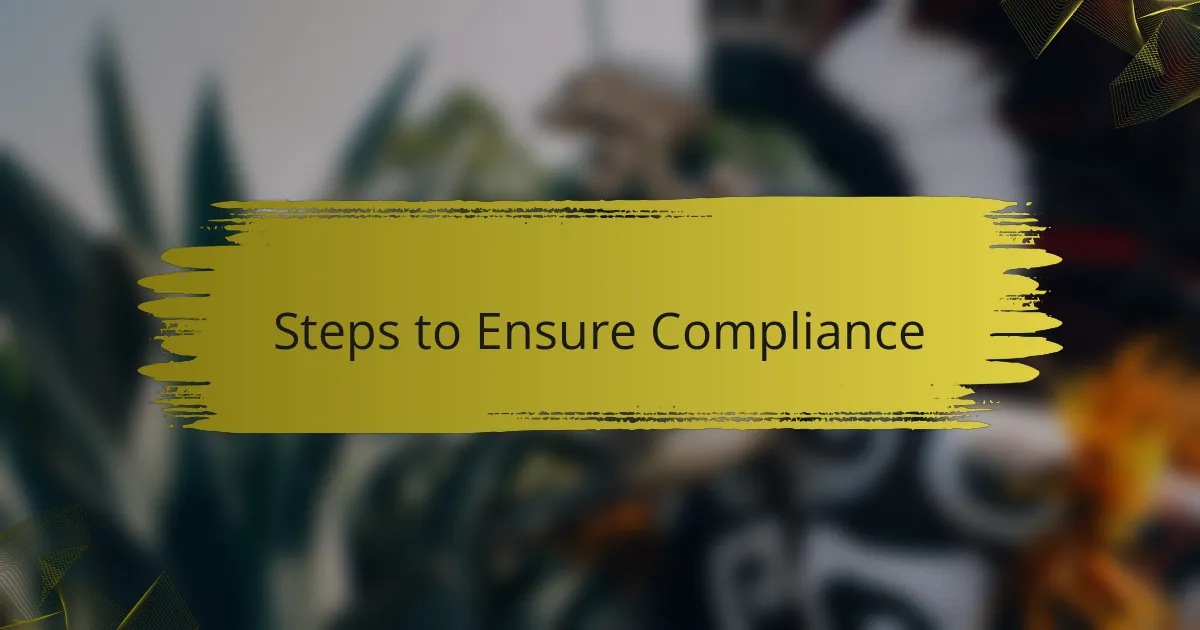
Steps to Ensure Compliance
When I first delved into the world of FCC compliance, I quickly learned that staying organized is crucial. I developed a checklist to keep track of key requirements, which included filing relevant paperwork on time and ensuring our content met regulatory guidelines. It can be daunting, but seeing everything fall into place gave me a sense of accomplishment and relief.
Through my experience, I realized that regular training for our team members was vital. Keeping everyone informed about the latest regulations not only fosters a compliant environment but also creates a culture of accountability.
Here are some steps to ensure compliance:
- Conduct thorough research on relevant FCC regulations specific to your radio operations.
- Create a comprehensive checklist of all necessary filings, deadlines, and requirements.
- Schedule regular training sessions for your team on compliance topics.
- Stay updated on any changes in the regulations to adapt your practices accordingly.
- Engage with legal professionals for clarification on complex issues when needed.
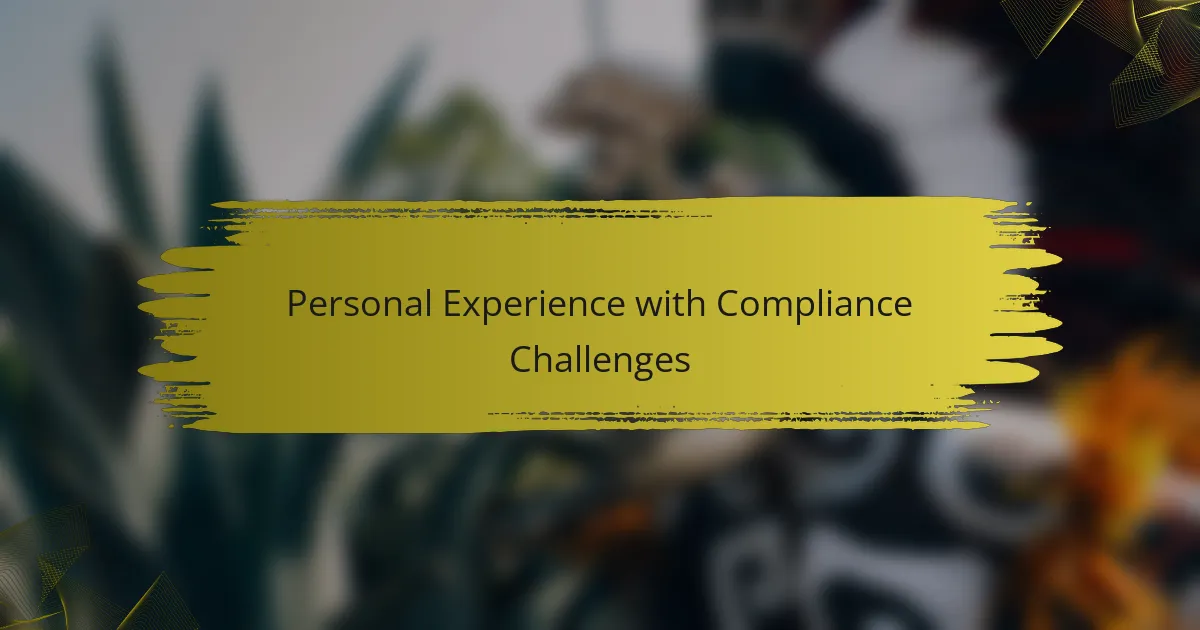
Personal Experience with Compliance Challenges
Navigating FCC compliance regulations can be a daunting task for anyone in the independent radio media space. I remember feeling overwhelmed when I first started; each regulation seemed more complex than the last. There were moments of frustration, but those experiences also fueled my determination to learn the ins and outs of compliance effectively.
One specific challenge was understanding the nuances of licensing requirements. I vividly recall a situation where I nearly broadcast without the proper licensing. The relief I felt after addressing the issue was immense. This experience taught me the value of diligence and the importance of keeping clear records.
Below is a comparison table illustrating some common compliance challenges faced in independent radio media and my approaches:
| Compliance Challenge | My Approach |
|---|---|
| Understanding Licensing Requirements | Thorough research and consultation with experts |
| Content Regulations | Regular training and updates for the team |
| Record Keeping | Implementing a digital filing system |

Strategies for Successful Navigation
Navigating FCC compliance regulations can feel overwhelming, but I found that creating a systematic approach makes the process manageable. When I first started working in independent radio, I dedicated time each week to familiarize myself with different regulations. It was a slow process, but taking little steps made a big difference in my understanding and confidence.
One key strategy that helped me was developing relationships with industry experts and other station owners. I remember attending a few local workshops and finding a supportive community that shared insights and best practices. Engaging with others who faced similar challenges not only eased my journey but also provided valuable perspectives and resources.
Here are some strategies I recommend:
- Stay Informed: Regularly check the FCC’s website for updates and new regulations.
- Create Checklists: Develop checklists for various compliance requirements like licensing and public file maintenance.
- Network: Join industry groups or forums where you can learn from peers and ask questions about compliance challenges.
- Consult Professionals: If needed, don’t hesitate to hire a compliance expert who can guide you through complex regulations.
- Document Everything: Keep detailed records of your compliance efforts, as this can be invaluable during audits or inspections.
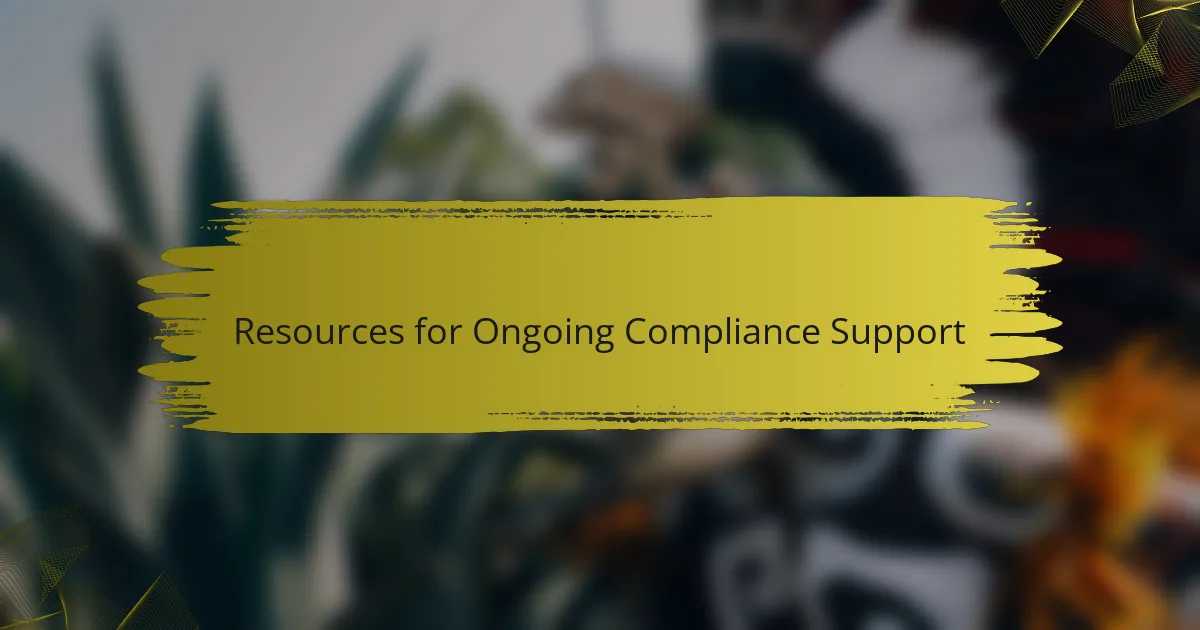
Resources for Ongoing Compliance Support
When it comes to staying compliant with FCC regulations, I find that having reliable resources is essential for any independent radio station. During my journey, I turned to industry associations and professional networks that not only provided guidance but also created a sense of community. It was comforting to connect with others facing the same regulatory challenges, sharing tips and celebrating successes together.
In addition to industry groups, I also discovered invaluable online tools and references that made navigating compliance less daunting. For instance, I often visited the FCC’s official website for updates and guidance, but I also became a regular at forums where fellow broadcasters exchanged insights. These platforms not only helped me understand the regulations but also spurred me to develop my own best practices.
Here are some resources that I’ve found particularly helpful:
- FCC Website: The most authoritative source for updates and guidelines.
- National Association of Broadcasters (NAB): Offers extensive resources for radio broadcasters.
- Broadcast Law Blog: An excellent place for legal insights and analysis related to FCC compliance.
- State Broadcasters Associations: Often provide localized support and training workshops.
- Webinars and Workshops: Look for events focused on FCC regulations to keep current with compliance strategies.
